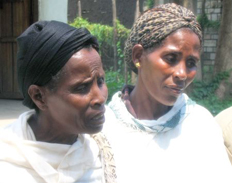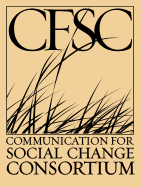|
|
|
 |
|
| Photo & banner by Ailish Byrne. |
|
|
| CFSC Consortium Body of Knowledge |
Are you looking for articles, books, essays, journals or reports on communication for development and social change? Is your interest HIV/AIDS, human rights or rural development? No matter what your issue, as long as it deals with communication for social change, you should be able to find useful references in the Body of Knowledge, the CFSC Consortium’s searchable database.
The body of knowledge has more than 3,000 references from around the world now registered. We invite you to consult the database for your use. And we encourage you to submit any reference you consider relevant to helping our database continue to grow. |
 |
| Inviting Artistic Images, Songs, Poetry Showing CFSC In Action |
Mazi invites your original images showing communication for social change in action. Whatever your medium"”photography, painting, sketches, mosaics, murals, songs or dances"”if you have an image showing people working together to give everyone a voice"”we will consider publishing it in our online magazine. Unfortunately, we are unable to return your submission. We also reserve the right to crop and/or edit your work for style and content. Each creator will be credited online for his or her submission.
Please e-mail your contribution to mazi@communicationforsocialchange.org |
 |
| Inviting Guest Contributors |
Do you know of interesting examples of successful applications of communication for social change principles within your community or country?
Mazi is looking for good case stories of CFSC at work: illustrations of the process of dialogue leading to community decision-making, action, implementation, monitoring, assessment and evaluation. We’re especially interested in examples of how communication processes have been strengthened or established at a community level by people who have been traditionally marginalized.
Help all of us build a better understanding of the many and varied ways that public dialogue leads to community decision-making and action. Describe for us where it takes place and why. Explain how CFSC is working. Inspire us all by telling us your community’s story.
Please e-mail your contribution of at least 250 words to mazi@communicationforsocialchange.org
Please make sure your story includes the CFSC elements: catalyst or catalytic event, problem identification, dialogue, decision-making, community action, monitoring and evaluation, and assessment of change at the individual and societal levels. Include your name, phone number, fax (if available) and email address.
The facts of all submissions will be verified. Once verified, they may be included either in Mazi or on the Consortium’s website. |
 |
|
|
|
|
| Message from Denise Gray-Felder |
| “The Toronto AIDS conference made vivid for me, once again, the power of one voice, one advocate, one gadfly for change.” The Consortium’s President, Denise Gray-Felder, urges us all to “listen to the voices of change." |
 |
| CFSC Anthology: Historical and Contemporary Readings |
Order today. Ready to ship. Receive Your Copy Within Days.
The Communication for Social Change Anthology:
Historical and Contemporary Readings
This groundbreaking book brings together a broad variety of views and features more than 150 key thinkers throughout the world. Edited by Alfonso Gumucio-Dagron and Thomas Tufte, the anthology reviews the evolution of communication for social change thinking from the early 20th century to the present. With more than 1,000 pages, this reference work is essential for communication and development experts as well as for anyone conducting business globally.
Click here now to order your copy. |
 |
| How Ethiopian Youth and Community Dialogues Fight HIV/AIDS by Ailish Byrne |
| Anti-AIDS Clubs and community conversations are ways the Consortium and its partners support local efforts to fight HIV/AIDS in rural Ethiopia. Here, in a follow-up to an article that appeared in Mazi’s November 2005 issue, Ailish Byrne, the Consortium’s senior associate for research and evaluation, describes CFSC in action. |
 |
| Focusing on People's Cultural Beliefs and Social Influences: Soul City's Approach by Lebo Ramafoko |
Nothing less than a social revolution is necessary to combat the real drivers of HIV in southern Africa, says Lebo Ramafoko, senior manager of South Africa's renowned Soul City Institute for Health and Development Communication, an institute that uses multiple media to present real-life drama about critical health and development issues. Speaking as part of a panel on "Refining the Prevention Paradigm," at the recent XVI International Conference on AIDS, Ramafoko argued that communication for social change, including storytelling that focuses on men's fears and women's yearning for empowerment, is the most consistent predictor of positive behavior.
We have edited her verbatim remarks here. You can view her slides by clicking on the end of this story. Video of this panel is also available through the Kaiser Family Foundation network coverage of the conference. |
 |
| New Horizons and Challenges in Communication for Social Change in Zambia by Ailish Byrne |
| What are the strengths and challenges of CFSC in action? Ailish Byrne, the Consortium’s senior associate for research and evaluation, considers that question in this piece describing an intensive three-day workshop on CFSC and participatory monitoring and evaluation that she and Denise Gray-Felder facilitated in Kabwe, Zambia. |
 |
| Time to Deliver: Report on the Toronto AIDS Conference by Heidi Larson |
| With encouraging calls for a social change approach to fighting AIDS heralded during the XVI International AIDS Conference, Heidi Larson, senior adviser of the Consortium, writes that changing the social and cultural context of AIDS communication will not be easy in many parts of the world. |
 |
| Media, Freedom and Poverty: A Latin American Perspective by Alfonso Gumucio |
| People in Latin America “are all looking at the same screen, and it is not our own screen,” says the Consortium’s managing director of programmes, Alfonso Gumucio-Dagron. In this article, Gumucio explains why Latin American mainstream media sometimes fail to represent the social, economic and cultural challenges of the region. |
 |
| Money Talk: Microfinance as a Means of Reaching People who are Poor by Stan Parish |
| While not a panacea for the world’s poorest people, microfinancing can be a useful catalyst for helping those living on the economic margins of a society. In this piece, guest contributor Stan Parish, who writes for various magazines, provides an overview of how microfinancing works and how it can help strengthen struggling communities. He argues that the whole point of microfinance is, eventually, to become irrelevant. |
 |
| CFSC Resources Available |
Now Available Communication for Social Change Anthology, Alfonso Gumucio-Dagron and Thomas Tufte, eds., South Orange, N.J.: Communication for Social Change Consortium Inc.
Who Measures Change: An Introduction to Participatory Monitoring and Evaluation of Communication for Social Change by Will Parks. South Orange, N.J.: Communication for Social Change Consortium Inc., 2005.
Measuring Change; A Guide to Monitoring and Evaluation of Communication for Social Change, ed. by Ailish Byrne with Denise Gray-Felder, Jim Hunt and Will Parks. South Orange, N.J.: Communication for Social Change Consortium Inc., 2005. This is an abridged version of the the longer Parks book.
Communities Measure Change: A Reference Guide to Monitoring Communication for Social Change, developed by CFSC Consortium, 2005.
This is a poster sized at-a-glance reference for use with community-based CFSC training sessions and is not intended to be a stand-alone document. Contact the CFSC Consortium for information on training and this reference guide.
Making Waves: Stories of Participatory Communication, ed., Alfonso Gumucio-Dagron. New York, N.Y.: Rockefeller Foundation, 2001. Available in English, French and Spanish. Limited availability.
Communication for Social Change Consortium brochure. Available in English, French and Spanish. |
 |
| Useful Links |
Cultural Diversity: A Latin American Perspective
Cultural exchange is a dialogue among cultures, and for a dialogue to be fruitful, it has to be horizontal; it has to happen on equal terms among two or more parties willing to be fair to each other, parties willing to “trade their cultures” in an engagement in which there are no losers. So argues the Consortium’s managing director of programmes, Alfonso Gumucio-Dagron, in this essay, which appeared earlier this year in Media Development. For more, visit
http://www.wacc.org.uk/
International Society for Competitiveness: Call for Papers
The International Society for Competitiveness (ISC) and PES School of Management, Banglore issue a call for papers to be presented at the International Conference on Emerging Competitiveness Paradigms at Goa, India January 11-12, 2007. Deadline: Sep 01, 2006. \The ever-increasing pace of change in the landscape of the global marketplace has forced organizations around the world to creatively search for competitive advantage. Consequently, new paradigms of competition and competitiveness have emerged in various parts of the world. Today’s organizations navigate the uncharted business terrain by espousing various strategies that enhance their competitiveness. http://www.eberly.iup.edu/asc/GOA%20Conference.htm
Making Governance Work for the Poor
In July, the UK government issued a white paper on international development, which sets out what it intends to do to reduce world poverty over the next five years. A major theme: developing-country governments must be accountable. For more, visit
http://www.dfid.gov.uk/wp2006/
Memories for Surviving Kids Inc
The mission of this organisation is to encourage friends and family of deceased parents to write letters to the surviving children. The aim is to use communication to help children hold on to their roots. For more, visit their Web site:
http://www.mfsk.org
Water and Sanitation: Two Peruvian Case Studies
Water Works: Capacity and Communication for Social Change in Peruvian Municipalities is the thesis of April Pojman, a graduate of Canada’s University of Guelph. Pojman explored two case studies, one rural and one urban. For more, visit her Web site:
http://www.yapame.com/waterworks.htm
XVI International AIDS Conference, Toronto, Canada, August 13-18, 2006
The most recent International AIDS Conference, entitled “Time to Deliver,” featured the latest information and much controversy about what’s being done—and not being done—to stop the pandemic. The official conference Web site: http://www.aids2006.org/. And, if you’d like to see transcripts of any of the sessions, visit http://www.kaisernetwork.org/aids2006/
|
| Donating Made Quick and Easy Online |
| If you would like to donate to the CFSC Consortium, it is now easier than ever. Simply visit our Web site. We now accept MasterCard, Visa, Amex, and Discover. |
 |
|








